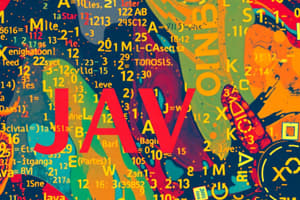Podcast
Questions and Answers
Which statement accurately describes the use of the static keyword when applied to a method in Java?
Which statement accurately describes the use of the static keyword when applied to a method in Java?
- The method belongs to the class itself rather than to any specific instance of the class. (correct)
- The method can only be called once during the program's execution.
- The method cannot be accessed from outside the class.
- The method can be overridden by subclasses.
Consider the following code snippet: System.out.println(5 + 3 * 2);. What will be the output?
Consider the following code snippet: System.out.println(5 + 3 * 2);. What will be the output?
- 16
- 10
- 13
- 11 (correct)
In Java, a constructor can have a return type, such as int or String.
In Java, a constructor can have a return type, such as int or String.
False (B)
Which access modifier restricts access of a class member to only within its own class?
Which access modifier restricts access of a class member to only within its own class?
The ______ keyword is used to create a new object in Java.
The ______ keyword is used to create a new object in Java.
What is the primary purpose of the return keyword in a Java method?
What is the primary purpose of the return keyword in a Java method?
Which of the following is NOT a primitive data type in Java??
Which of the following is NOT a primitive data type in Java??
Match each term with its corresponding description regarding Object-Oriented Programming principles:
Match each term with its corresponding description regarding Object-Oriented Programming principles:
Which of the following is a valid way to declare an array in Java?
Which of the following is a valid way to declare an array in Java?
What is the result of the following expression: true && false?
What is the result of the following expression: true && false?
Which of the following loop types is specifically designed to execute a set number of times?
Which of the following loop types is specifically designed to execute a set number of times?
Which statement accurately describes a method signature in Java?
Which statement accurately describes a method signature in Java?
The main() method can be overloaded in Java.
The main() method can be overloaded in Java.
String objects in Java are mutable.
String objects in Java are mutable.
Explain the difference between StringBuilder and StringBuffer.
Explain the difference between StringBuilder and StringBuffer.
What are accessor and mutator methods? Provide an example.
What are accessor and mutator methods? Provide an example.
The ______ keyword refers to the current object instance and is used to distinguish between instance variables and parameters when they have the same name.
The ______ keyword refers to the current object instance and is used to distinguish between instance variables and parameters when they have the same name.
Match the loop type with its appropriate use case:
Match the loop type with its appropriate use case:
Flashcards
System.out.println()
System.out.println()
The correct way to display text output in Java.
Object-Oriented Programming
Object-Oriented Programming
A fundamental style of programming based on objects, including encapsulation, inheritance, and polymorphism.
void keyword
void keyword
Used in a method declaration to specify that the method does not return any value.
x++ (post-increment)
x++ (post-increment)
Signup and view all the flashcards
private access modifier
private access modifier
Signup and view all the flashcards
new keyword
new keyword
Signup and view all the flashcards
Valid Identifier
Valid Identifier
Signup and view all the flashcards
static keyword
static keyword
Signup and view all the flashcards
Valid Array Declaration in Java?
Valid Array Declaration in Java?
Signup and view all the flashcards
true && false
true && false
Signup and view all the flashcards
Loop for Specific Iterations
Loop for Specific Iterations
Signup and view all the flashcards
Method Signature
Method Signature
Signup and view all the flashcards
Multiple Constructors
Multiple Constructors
Signup and view all the flashcards
Break Statement
Break Statement
Signup and view all the flashcards
Final Keyword
Final Keyword
Signup and view all the flashcards
Accessor vs. Mutator Methods
Accessor vs. Mutator Methods
Signup and view all the flashcards
StringBuilder vs. StringBuffer
StringBuilder vs. StringBuffer
Signup and view all the flashcards
Primitive vs. Reference Types
Primitive vs. Reference Types
Signup and view all the flashcards
Study Notes
Multiple Choice Questions
- The correct syntax to print "Hello, World" in Java is
System.out.println(“Hello, World”); - Compilation is NOT a principle of Object-Oriented Programming
- The keyword
voiddefines a method that does not return a value - The code
int x = 10; System.out.println(x++);outputs 10 - The
privateaccess modifier allows a class member to be accessible only within its own class - The
newkeyword in Java creates an object firstVariableis a valid identifier in Java.System.out.println(5 + 3 * 2);will output 11.- Constructors must have the same name as the class and can be private.
- The
statickeyword indicates the method belongs to the class rather than an instance. Stringis NOT a primitive data type in Java- The default value of an integer variable in Java is 0.
- The
Scannerclass is used to handle user input in Java. - The code
String str = "Hello"; str = str + " World"; System.out.println(str);outputs "Hello World". - The if-else structure can have multiple
else ifbranches. - The
returnkeyword returns control to the calling method and a value from the method. int[] arr;andint arr[];are valid ways to declare an array in Java.- The expression
true && falseresults infalse. - A
forloop is used to create a loop that executes a specific number of times. - A method signature is correctly described by its method name and parameter list.
True/False Questions
- The
main()method can be overloaded in Java: True - A class can have multiple constructors: True
- The
assertstatement can be used to test assumptions in code: True Stringobjects in Java are mutable: False- The
breakstatement can be used to exit a loop prematurely: True - The
finalkeyword can prevent a variable from being reassigned: True - The
switchstatement can only evaluate integer expressions: False - The
Math.random()method returns a random integer: False - The
StringBufferclass is synchronized and thread-safe: True - A method can have multiple return statements: True
Short Answer Questions
- A
whileloop continues until a specified condition is false, while aforloop iterates a set number of times, based on initialization, condition, and increment/decrement expressions. - Accessor (getters) methods retrieve the value of a field, while mutator (setters) methods modify the value of a field.
- Example:
- Getter:
public int getAge() { return age; } - Setter:
public void setAge(int age) { this.age = age; }
- Getter:
- Example:
- The
assertoperator is used for debugging to make sure a condition is true at a certain point in the program. StringBuilderis not synchronized and is faster for single-threaded operations, whileStringBufferis synchronized and thread-safe.- Example Java class:
class Car {
private String model;
private int year;
public Car(String model, int year) {
this.model = model;
this.year = year;
}
public String getModel() {
return model;
}
}
- The
Scannerclass gets input from sources like user console input, and can parse primitive types and strings. - Method overloading allows multiple methods with the same name but different parameters (types, number, or both) to exist in the same class.
- Example:
public int add(int a, int b) { return a + b; } public double add(double a, double b) { return a + b; } - The
thiskeyword refers to the current object instance and distinguishes between instance variables and parameters having the same name. - The software engineering life cycle phases: Requirements Analysis, Design, Implementation, Testing, Deployment, and Maintenance.
- Primitive types are basic data types (like
int,char,boolean) holding values directly, while reference types (likeString, Arrays, Objects) hold references to the actual data in memory.
Studying That Suits You
Use AI to generate personalized quizzes and flashcards to suit your learning preferences.




